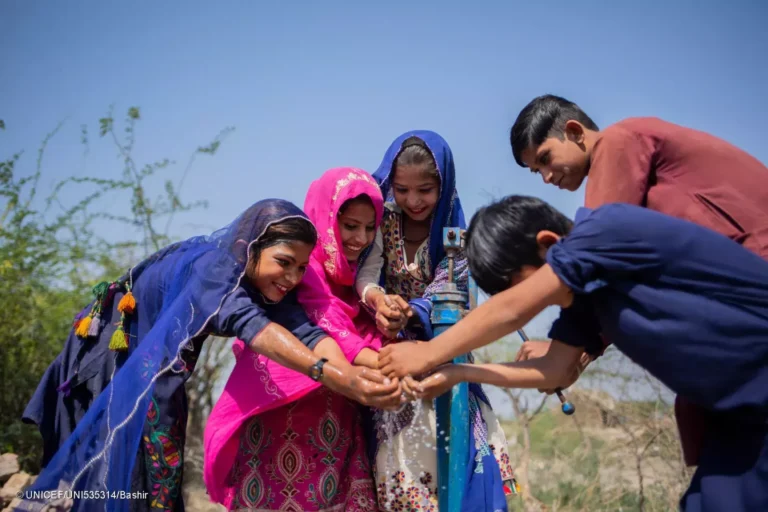ISLAMABAD/NEW YORK, 31 May 2024 – Providing more health facilities with resilient energy in Pakistan could avert over 175,000 deaths by 2030 and contribute US$ 296 million to the Pakistani economy by 2044 through lower maternal, adult and infant mortality rates and reduced disease burden through improved energy resilience, according to a new UNICEF study.
Resilient energy refers to reliable, flexible, accessible and quality electricity supply that can withstand and quickly recover from unexpected shocks such as power outages and floods. Research conducted by UNICEF’s Economist Impact Unit shows that investments in resilient energy across health, education and water services can deliver other significant benefits for children across the country, yielding returns up to three times the investment.
For example, providing resilient electricity to schools would reduce dropout rates, improve children’s learning, and help them earn more in the future. This would boost Pakistan’s economy by $2.3 billion by 2040, according to the study. Given that Pakistan recently declared a state of education emergency, investments addressing energy resilience could help put 26 million out-of-school children back in school. It would also power about 20 percent of off-grid schools in two provinces of Pakistan.
Additionally, relentless heatwaves have pushed temperatures to over 50°C in some areas. Demand for electricity has skyrocketed, straining existing sources. Cooling is a challenge due to power outages and massive shortages. This puts children’s health at risk, potentially causing dehydration, diarrhea and more serious health complications.
“Children depend on schools, health centres and safe drinking water to survive, but these facilities often lack the electricity supply to function optimally. Now, with extreme heat hitting much of the country, demand for electricity is skyrocketing, leading to shortages that put children’s health at risk,” said Abdullah Fadil, UNICEF Representative in Pakistan. “This study highlights the importance of implementing resilient energy solutions that not only save children’s lives and improve their well-being, but also contribute to economic growth. Clearly, this is a win-win for Pakistan’s children, families, teachers, private sector and economy. And the transition to renewable energy has never been more urgent, especially for children who are already bearing the daily impacts of climate change.”
Globally, 3.5 billion people live without reliable electricity, most of them in developing regions, where blackouts can interrupt hospital operations and cause artesian wells and other sources of drinking water to dry up.
Moreover, climate change is hindering energy production and distribution. In 2022, floods in Pakistan damaged almost half of all water structures, including water storage tanks, wells, and supply mains. The floods severely damaged major river systems that carry 25% of Pakistan’s energy supply.
UNICEF responded by using smarter design to rehabilitate 375 water systems benefiting 350,000 people. The new wells have beds higher than expected flood heights, frameworks to provide stability, and protective barriers to reduce potential damage.
Research shows that when resilient energy is fully harnessed, families and children in remote areas can experience fewer power outages and improved water quality and supply, which can help protect children from disease and increase agricultural production.
Investment and political action from both the public and private sectors will help deliver a green and just energy transition, which is why UNICEF calls for:
- Expand investments in resilient, sustainable and green energy solutions for health, education and safe water supply in developing countries. These solutions are the best, most efficient and cost-effective ways to address energy shortages in light of the climate crisis and achieve net-zero targets. Investments can also extend beyond business value chains.
- Support policies and initiatives to promote the adoption of renewable energy.
- We partner with development finance institutions to provide blended finance solutions.
Providing renewable energy is a key part of UNICEF’s sustainability and climate agenda. To date, UNICEF has implemented several solar power initiatives. For example, three 250kWp hospital solar power systems have been installed across Pakistan to provide uninterrupted renewable energy to power equipment to save newborns and their mothers. Globally, UNICEF has provided 12,514 solar-powered vaccine cold chain equipment and built 1,855 solar-powered water systems in 2022, improving access to safe water for people and children in communities, health facilities and schools.
“Pakistan has abundant renewable resources and by investing in them, we are striking a gold mine to help children,” Fadil added. “But we can’t do it alone. Public sector resources alone will not be enough and the private sector needs to play a bigger role. This is everyone’s job.”
#####
Notes to editors
The full report can be found here.

